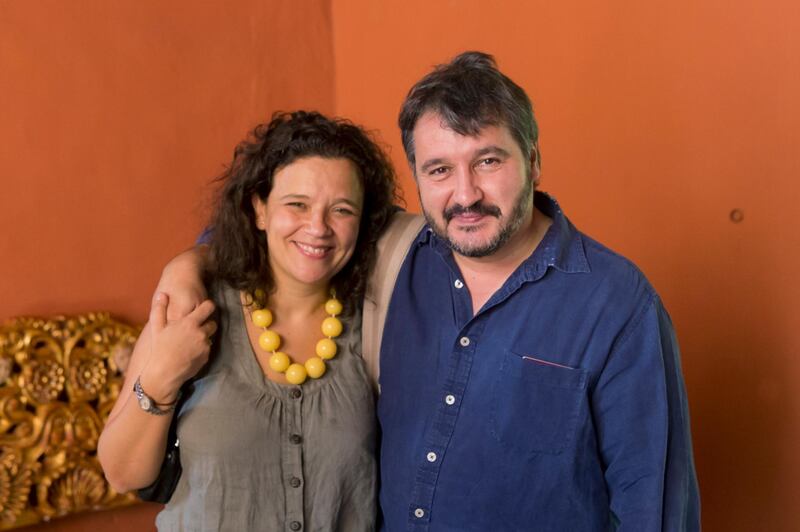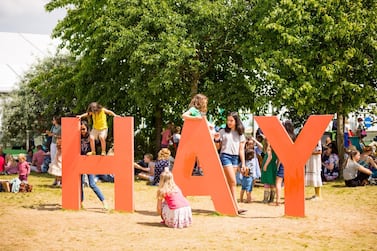Hay Festival director Peter Florence has been looking for somewhere to host another event in the Middle East for some time now. It is six years since the international literary festival was held in Beirut and 10 years since Beirut39, where Hay Festival brought together 39 of the most exciting authors of Arab heritage under the age of 40 and published an anthology of their works. "We've tried various options and none of them felt quite right," says Florence.
Over the past few years, however, a series of conversations have been taking place between Hay Festival and the Ministry of Culture and Knowledge Development in Abu Dhabi. Senior figures from the government department were invited to Hay Festival in Cartagena, Colombia and Queretaro, Mexico, while members of Florence's team have visited Abu Dhabi. Earlier this year, at Hay Festival's flagship event in Wales, Emirati poet Nujoom Alghanem performed.
The advances have been cautious from both sides. “We wanted to make sure that they knew exactly what they were going into,” says Florence. “Because what we do is not always comfortable.”
But this week, at a press conference at Manarat Al Saadiyat attended by Florence, Hay Festival international director Cristina Fuentes La Roche and Minister of Tolerance Sheikh Nahyan bin Mubarak, Hay Festival Abu Dhabi was announced. "We recognise the importance of sharing ideas, education and cross-cultural interactions, for which Hay Festival is celebrated," said Sheikh Nahyan.
Florence, at last, believes he has found a home in the Middle East for the festival he and his parents started in Wales all the way back in 1987. “We’re taking a long view,” he says. “We’ve been in Colombia for 15 years, Spain for 14 years and Mexico for 10 years. We’ve seen how things evolve, we’ve seen how the shape of the conversation develops and this is a dynamic society. I’m fascinated to see where it goes.
“Literature asks questions, it is about looking at an orthodoxy and sceptically seeing how that orthodoxy fits with life, so it’s always, to a certain degree, a disruption,” he continues. “The willingness to embrace our questioning is one of the things that gives me hope that this will be a success.” Fuentes La Roche adds: "We have complete freedom. Of course, we are sensitive but we are who we are and we are happy to create these spaces for conversation and dialogue in a respectful and tolerant way."
Details about Hay Festival Abu Dhabi, which will take place from Monday, February 24 to Thursday, February 27, are scarce at the moment. What we do know is that it will be held at venues across the city, with the hub at Manarat Al Saadiyat, while the line-up of speakers includes Omani author Jokha Alharthi, Lebanese novelist Hoda Barakat, and Syrian poet Adonis, who will celebrate his 90th birthday at the event with a poetry gala, bringing together poets from around the world. A full programme is expected to be announced in November.
One thing Florence and Fuentes La Roche are absolutely clear about, though, is that Arabic and south Asian literature will be front and centre. “We don’t want to import Hay from Wales to Abu Dhabi,” says Fuentes La Roche. “We want to create something new and meaningful for them, as well as for us.”
“We’re not on some imperial kick,” adds Florence. “We’re on an adventure to explore local literature […] The surprise is always quite how extraordinarily rich the diversity is here [in Abu Dhabi]. There are so many languages, so many cultures and we have an ambition to do events here, obviously in Arabic, English and French, but also in Malayalam, Hindi, Urdu and Bangla. We know we’re going to find audiences for all those languages and many, many more.”
And what about Emirati literature? “You bet, yeah,” says Florence. “There’s a great spoken word culture here. The first thing I heard when I arrived a couple of years ago was, ‘There are these people [doing an open mic poetry night], they’re doing amazing stuff.’”
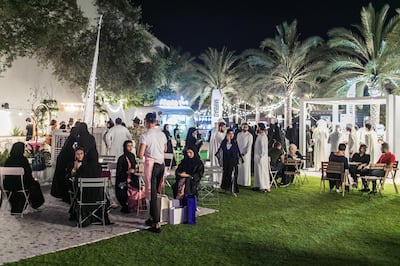
Florence is, of course, talking about the long-running open mic poetry night, Rooftop Rhythms, which is held every month at NYU Abu Dhabi. "You look at them and think, actually this is not a book literary culture," he says. "It's a performance literary culture and it's clearly engaging lots of people both in Arabic and English." Needless to say, then, aside from the programme of literary talks, we can expect plenty of spoken word, theatre, comedy and music at Hay Festival Abu Dhabi.
During the press conference, Florence spoke about "an extraordinary golden age" for Arabic literature. He believes that this is a generational, rather than geographical, trend. When Hay Festival began searching for people to include in its anthology of young Arabic writers, Beirut39, published in 2009, Florence admits that he expected most of the writers to be from established literary cultures, such as Egypt. But he was wrong. There were writers from Algeria, Oman, Saudi Arabia and Yemen, among many other countries.
Saudi Arabian novelist Mohammed Hasan Alwan, who will be speaking at Hay Festival Abu Dhabi, went on to win the 2017 International Prize for Arabic Fiction, Iraqi author Ahmed Saadawi won the same award in 2014 for his novel Frankenstein in Baghdad and Syrian writer Samar Yazbek was awarded the PEN/Pinter prize in 2012.
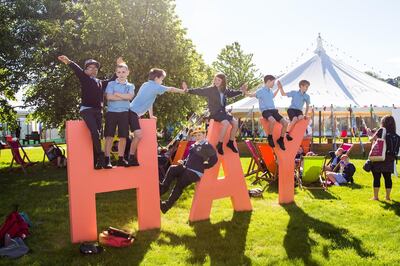
"In the last 10 years, we have seen a race of good quality," says Fuentes La Roche. "The Arab region has a lot of traditional poetry but I think now we are seeing fiction writing as well. And not only the Arab writers from the diaspora, like Elias Khoury. We are now starting to hear voices from within the Arab world being projected internationally."
And the UAE is having increasing influence on the region's literary landscape. Sharjah is currently World Book Capital and the Sharjah International Book Fair in November is expected to be bigger than ever, while the Emirates Airline Festival of Literature will be celebrating its 11th year at the beginning of February. Isobel Abulhoul, chief executive of the Emirates Literature Foundation, which organises the Dubai event, was at the Hay Festival Abu Dhabi press conference. The feeling is that the two festivals can complement each other.
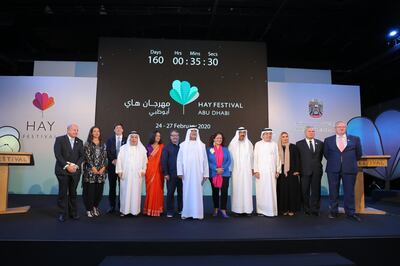
“It’s not a competitive market,” says Florence. “It’s a market where, if you’re in the business of sharing stories, everybody is working together. There’s a collaborative, collegiate nature to literature because it’s about generosity. And we’re at this moment of energy and adventure within the Emirates. How this one will fit into that picture, we don’t know yet. We’ll wait and see – that’s the beauty of it. [Hay Festival] is not something you put somewhere, it is in itself a kind of constantly reforming improvisation.”
Some of the most exciting literature festivals in the world are those, such as the Jaipur Literature Festival, where everyone is crammed in together, bustling from stage to stage, bumping into friends old and new. The expectation is that Hay Festival Abu Dhabi will be spread out across the city. Despite this, Florence wants to ensure that Manarat Al Saadiyat acts as the beating heart of the event, the place where people gather to share ideas and disagree. But, he argues, Abu Dhabi has some of “the most beautiful facilities on earth”, so it would be a shame not to use them.
“The challenge always is how you humanise them and get the public to engage with them,” he says. “I’m tremendously encouraged by everything I’ve seen. We put up in tents in Hay-on-Wye [in Wales] and we come here and we get palaces. It’s tremendously exciting.”
Time, then, for Abu Dhabi to make Hay while the sun shines.
